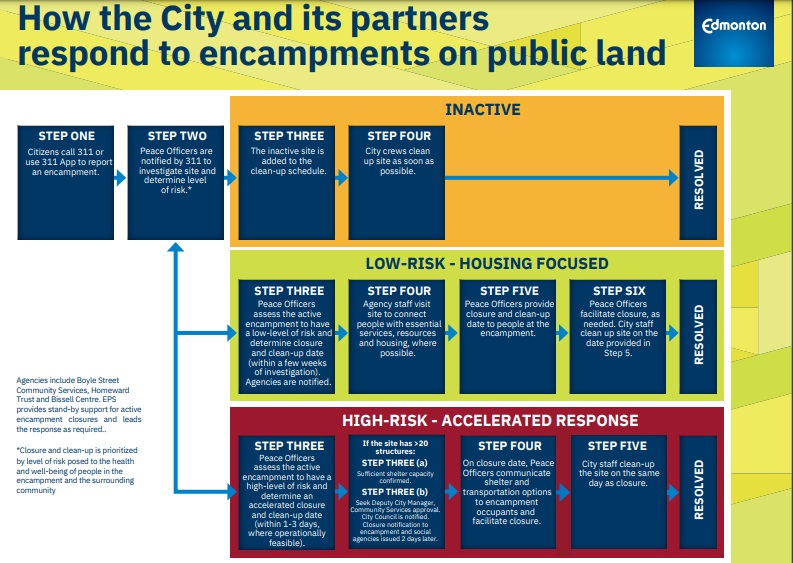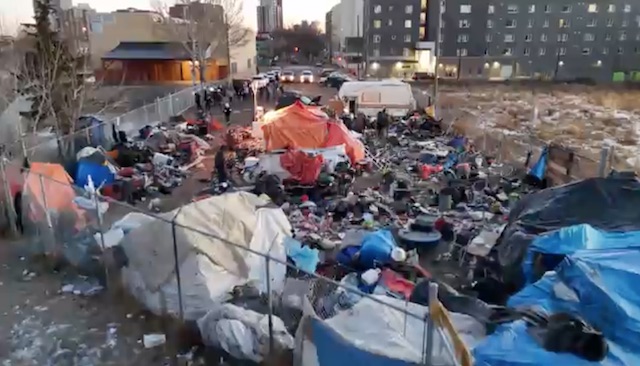City of Edmonton
City of Edmonton launches emergency response to deal with extreme heat

News Release from The City of Edmonton
|
|
City of Edmonton
City of Edmonton defends response to homeless encampments

Edmonton homeless encampment from 2022 (Photo: Alexander Shamota, Alberta Views Magazine).
News release from the City of Edmonton
Overview of the City of Edmonton’s information in Court about its response to homeless encampments
- While numbers of shelter beds and unhoused persons vary from day to day, Edmonton’s shelters have had excess capacity throughout 2023, with even more capacity available in 2024. In periods of extreme demand, capacity can be scaled upwards immediately. A person seeking indoor shelter in Edmonton will never be left without an indoor place to shelter.
- Edmonton’s shelter system supports and accommodates persons with diverse backgrounds and lived experiences, including persons who use drugs, all genders and sexualities, all religions, couples, and persons with disabilities. Edmonton has Indigenous-led shelter spaces, women-only spaces, and specialized shelter programming for Indigenous persons who have experienced trauma.
- Outdoor sheltering poses severe dangers to the unhoused. Evidence will be presented of examples of gang victimization, armed robbery, physical and sexual assault, sexual exploitation, sanitation issues leading to disease, frostbite and cold-weather injuries, and fatalities caused by tent and encampment fires. These risks will be shown to be attributable to outdoor sheltering, not the removal of encampments.
- In the last five years, Edmonton Fire Rescue Services has reported at least seven deaths and 26 injuries from 276 fires that could be attributed to tents or encampments. This number is likely a significant underestimate due to the challenges inherent in investigating these types of fires.
- Expert medical evidence from Alberta’s former Chief Medical Officer of Health will be presented showing that encampments increase potential communicable disease transmission and fire- and violence-related injuries when compared with emergency shelters.
- Encampments can pose a danger to the community at large. Evidence will be presented of violence arising from encampments, accumulations of human feces, biohazardous waste, weapons and drug paraphernalia surrounding encampments, uncontrolled fires and propane cylinder explosions, and examples of wildfires starting at encampments in Edmonton’s natural areas.
- The number of complaints from members of the public has significantly risen over the last number of years. Between January 1, 2023 and October 22, 2023, there were 13,683 complaints from concerned Edmontonians.
- Encampment closures are evaluated on a risk matrix. This is an attempt to respond to community concerns, ongoing damage to the environment and infrastructure, as well as the inherent dangers in outdoor encampments. When camps are first assessed and again when closed, offers are made to take individuals to a shelter. As well, during the encampment closure process, opportunities are provided for individuals to connect with various community organizations supporting the unhoused.
- Evidence will be presented on the impacts associated with Camp Pekiwewin (2020). The City has been provided evidence of physical and sexual violence, gang violence, sex trafficking, sanitation and biological health hazards for occupants of Camp Pekiwiwin. Evidence provided by residents of the Rossdale community shares examples of violence and physical assault, theft of property, residents leaving the community for their own safety, vandalism, fire, and significant River Valley damage due to firewood cutting by encampment occupants.
Alberta
Province forms Edmonton Public Safety Cabinet Committee in response to homeless encampment crisis

Edmonton encampments: Deputy Premier Ellis
Deputy Premier Mike Ellis issued the below statement in response to Edmonton Mayor Amarjeet Sohi’s announcement of his intention to declare an emergency:
“In November, Premier Danielle Smith ordered that an emergency cabinet committee be created and convened in response to the issue of crime and gang-related activity within encampments across the City of Edmonton.
“Alberta’s government cares deeply about vulnerable Edmontonians and we will always ensure that anyone who wants shelter and supportive services will receive it. However, we will not stand by and watch as vulnerable Albertans and the general public continue to be extorted, taken advantage of and killed by gangsters and deadly drugs.
“The Edmonton Public Safety Cabinet Committee (EPSCC) is comprised of ministers from departments that oversee operations and/or administer programs that promote public safety and support the transition of Edmonton-based encampment residents into safe, secure and appropriate arrangements.
“The cabinet committee membership includes:
- Danielle Smith, Premier (chair)
- Mickey Amery, Minister of Justice
- Mike Ellis, Minister of Public Safety and Emergency Services
- Adriana LaGrange, Minister of Health
- Ric McIver, Minister of Municipal Affairs
- Jason Nixon, Minister of Seniors, Community and Social Services
- Searle Turton, Minister of Children and Family Services
- Dan Williams, Minister of Mental Health and Addiction
- Rick Wilson, Minister of Indigenous Relations
“Also sworn into the committee are:
- Cody Thomas, Grand Chief, Confederacy of Treaty Six First Nations
- Dale McPhee, Chief, Edmonton Police Service
“This committee has met continuously since its initial meeting on Nov. 29, 2023, to plan a joint response. Our government is working on an action plan alongside Alberta Health Services, Edmonton Police Service, the Confederacy of Treaty Six First Nations and several departments from the City of Edmonton, including Edmonton Fire Rescue Services.
“Our government will continue to respond to these issues following the expected court decision on Jan. 16, no matter the outcome. We will have a more detailed statement regarding this response once the court decision is made.”
Additional quotes
“It is dangerous for the mayor and others to continue to suggest that vulnerable Albertans do not have anywhere to turn. This is false and will lead to more folks choosing not to seek out shelter because they fear they’ll be turned away. I have said before and will continue to say: there is safe space in shelters around the city and nobody will be turned away. We have more than enough room for every homeless person in the city of Edmonton to have a warm, safe place to stay. It is completely inappropriate and dangerous for the mayor, or anyone, to suggest Edmonton is out of capacity in our social services sector or our emergency shelter systems. Anyone needing shelter space will be kept care of.”
Jason Nixon, Minister of Seniors, Community and Social Services
“I have been working and will continue to work diligently alongside the provincial government, in the spirit of reconciliation, for months on the serious action that is needed to get all people off the streets, including First Nations people. Encampments are not a safe place and letting people overdose and freeze in the cold is not reconciliation.”
Cody Thomas, Grand Chief, Confederacy of Treaty Six First Nations
-

 COVID-1910 hours ago
COVID-1910 hours agoOntario man launches new challenge against province’s latest attempt to ban free expression on roadside billboards
-

 Business2 days ago
Business2 days agoWhile China Hacks Canada, B.C. Sends Them a Billion-Dollar Ship Building Contract
-

 Energy18 hours ago
Energy18 hours agoThis Canada Day, Celebrate Energy Renewal
-

 Alberta1 day ago
Alberta1 day agoSo Alberta, what’s next?
-

 Alberta9 hours ago
Alberta9 hours agoAlberta Next Takes A Look At Alberta Provincial Police Force
-

 Bjorn Lomborg2 days ago
Bjorn Lomborg2 days agoThe Physics Behind The Spanish Blackout
-

 Alberta11 hours ago
Alberta11 hours agoCanadian Oil Sands Production Expected to Reach All-time Highs this Year Despite Lower Oil Prices
-

 International12 hours ago
International12 hours agoPresident Xi Skips Key Summit, Adding Fuel to Ebbing Power Theories





